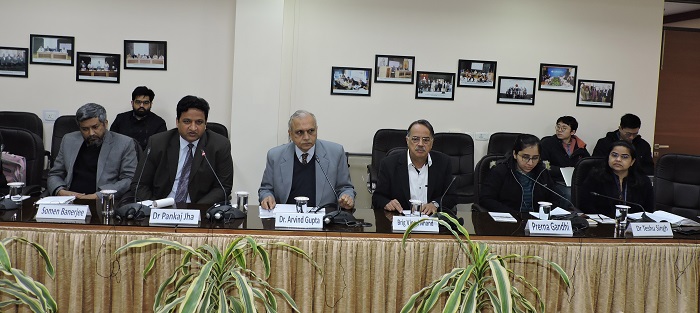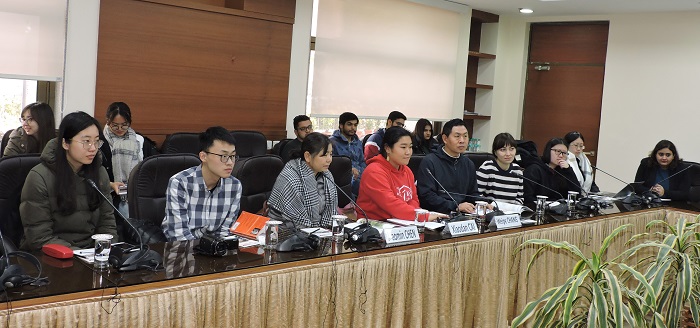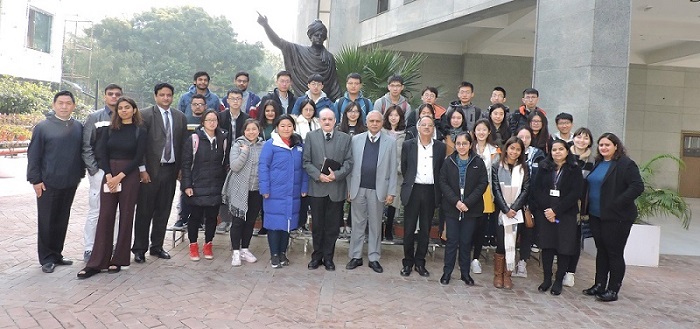The VIF hosted a 23 member delegation from the Tsinghua University, Beijing on 30 January 2019. The delegation was visiting India as a part of O. P. Jindal Global University-Tsinghua India Immersion Programme. Dr Arvind Gupta, Director, delivered the opening remarks and explained the historical significance of the Republic Day for India and that the Indian Constitution guarantees ‘fundamental rights’ to all its citizens that is enforceable in the courts. The democratic system has served us well and unlike Pakistan, India has maintained its unity and integrity. On India-China relations, he explained that both the countries have been historically connected. Trade even now has been growing fast but it’s lop-sided. Tourism is increasing between the two sides. There is a great curiosity internationally as to how the relationship is developing.

The students were inquisitive about how the India-China relations would shape up in the election year in India. Indian participants explained that the India-China relations should not be seen in an election cycles. There were some structural issues in the bilateral relationship that determine the relationship. Through discussion and dialogues, these issues don’t get out of hand which means that both the country are learning to manage the relationship. The relationship has matured over the years. The students were curious to know how India and China could collaborate in Afghanistan. The Indian participants reiterated that both the countries were jointly training Afghan diplomats but currently there were no joint infrastructure projects in the area.
With respect to the Belt and Road Initiative (BRI), the Chinese students were interested in knowing if India has its own Belt and Road Initiative. The Indian participants clarified that the position of the Indian government on the OBOR/BRI has not changed. India has reiterated that any project that violates the sovereignty of the country is objectionable. They further elucidated that BRI has become a kind of contested term. India’s focus of is development aid, for example, is not much infrastructure-focused as the Chinese were; it was on capacity building and socio-economic development. India has several ongoing projects in Africa, Southeast Asia and Afghanistan which has not received much attention.

On the domestic issue, the Chinese students were keen to know as to how India manages unequal growth, its environment problem and despite having so many diverse languages maintain unity. It was explained that since independence the thrust of the Indian government has been growth with distribution. Additionally, India has a progressive taxation policy which also looks at the redistributive justice aspect. On the issue of environment, the Indian participants explained that the Indian Government has initiated the Swachh Bharat Abhiyan that is a nation-wide campaign in India to clean up streets, roads and infrastructure of India’s cities, town and rural areas. The mission will also contribute to India reaching Sustainable Development Goal 6 (SDG 6), established by the UN in 2015. On the issues of Climate change, India is in the lead position. India already has a dedicated Ministry for Environment, Forest and Climate Change.
On employment, the Indian participants explained that India has bypassed the second stage of the development process and entered into the third stage of service. In India, growth is attributed to the service sector, whereby both employment and wages have seen a rise. Labour–intensive manufacturing sector did not become the engine of growth. In fact, it was the knowledge-intensive services sector which along with some segments of capital intensive manufacturing was the engine of growth in India. But these sectors by their nature were not employment-intensive. But the government is taking various initiatives and welfare schemes to generate employment.

The Chinese students were curious to know as to how India manages ‘selling its stories’ to the world. Indian participants explained that the International Yoga Day has found resonance in China. Indian culture has spread rapidly through Bollywood. Additionally, medical tourism has helped us in building the positive side of the Indian story.
Overall, the Chinese student had some knowledge about India and India-China relations but they were not well informed.








Post new comment